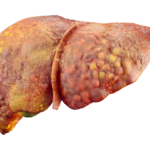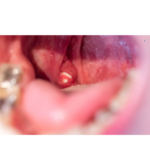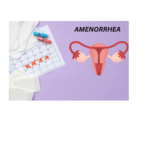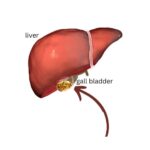Tonsillitis, an inflammation of the tonsils, is a common condition that affects millions of people worldwide. The tonsils are two oval-shaped pads of tissue located at the back of the throat, and they play a role in the body’s immune system by trapping and filtering out bacteria and viruses. However, when these pathogens infect the tonsils themselves, it can lead to tonsillitis. This blog will explore the symptoms, causes, and treatment options for tonsillitis.

Symptoms of Tonsillitis
The symptoms of tonsillitis can vary from mild to severe and typically include:
- Sore Throat: A persistent and severe sore throat is one of the most common symptoms.
- Red and Swollen Tonsils: The tonsils may appear red and swollen, often with white or yellow patches or spots.
- Difficulty Swallowing: Swelling can make swallowing painful or difficult.
- Fever: A high fever often accompanies tonsillitis.
- Bad Breath: Bacterial infection can cause a foul odor in the mouth.
- Swollen Lymph Nodes: Lymph nodes in the neck may be swollen and tender.
- Voice Changes: A hoarse or muffled voice is common due to swelling and inflammation.
- Headache and Ear Pain: These symptoms can also be present, reflecting the body’s overall response to the infection.
Causes of Tonsillitis
Tonsillitis is primarily caused by viral or bacterial infections. The most common causes include:
- Viral Infections: Viruses such as the common cold, influenza, and the Epstein-Barr virus (which causes mononucleosis) can lead to tonsillitis.
- Bacterial Infections: The most common bacterial cause is Streptococcus pyogenes, the bacterium responsible for strep throat. Other bacteria can also be responsible, but they are less common.
Diagnosis and Treatment
To diagnose tonsillitis, a healthcare provider will typically:
- Examine the Throat: A physical examination of the throat and tonsils is often the first step.
- Conduct a Throat Swab: A swab test can determine if bacteria, such as streptococcus, are present.
- Blood Tests: These may be used to identify the presence of viral infections like mononucleosis.
Treatment Options
Treatment depends on whether the cause is viral or bacterial:
- Viral Tonsillitis: Since antibiotics do not work against viruses, treatment focuses on symptom relief. This includes:
- Rest
- Hydration
- Over-the-counter pain relievers such as acetaminophen or ibuprofen
- Throat lozenges and gargling with warm salt water
- Bacterial Tonsillitis: If a bacterial infection is confirmed, antibiotics are prescribed. It is crucial to complete the entire course of antibiotics to prevent complications and ensure the infection is fully eradicated.
- Surgery (Tonsillectomy): In chronic or recurrent cases of tonsillitis, or if the condition leads to complications such as difficulty breathing or swallowing, a tonsillectomy (surgical removal of the tonsils) may be recommended.
Preventing Tonsillitis
While it’s not always possible to prevent tonsillitis, certain practices can reduce the risk:
- Good Hygiene: Regular hand washing, avoiding close contact with infected individuals, and not sharing eating utensils can help prevent the spread of infections.
- Healthy Lifestyle: Maintaining a strong immune system through a balanced diet, regular exercise, adequate sleep, and stress management can also help reduce the risk.
Homeopathic Medicine For Tonsillitis.
Homeopathy, a holistic system of medicine founded in the late 18th century by Samuel Hahnemann, offers alternative remedies for various health conditions, including tonsillitis. Homeopathic treatments aim to stimulate the body’s self-healing abilities using natural substances in highly diluted forms. This blog explores some of the common homeopathic remedies for tonsillitis and how they can help alleviate symptoms.
Common Homeopathic Remedies for Tonsillitis
- Belladonna: This remedy is often used when tonsillitis symptoms appear suddenly and with intensity. It is suitable for cases where there is a high fever, a bright red throat, and dryness. The patient may also have a throbbing headache and a flushed face.
- Hepar Sulphuris Calcareum (Hepar Sulph): Hepar Sulph is recommended for cases where the tonsils are swollen, painful, and there is a sensation of a splinter in the throat. The pain often worsens with cold drinks and exposure to cold air.
- Mercurius Solubilis (Merc Sol): This remedy is used for tonsillitis with swollen, red tonsils that have white or yellow spots. The patient may experience excessive salivation, bad breath, and a metallic taste in the mouth. Symptoms often worsen at night and with extremes of temperature.
- Phytolacca: Phytolacca is indicated for severe pain in the throat that extends to the ears when swallowing. The tonsils may appear dark red or bluish, and the patient might have difficulty swallowing both liquids and solids.
- Baryta Carbonica (Baryta Carb): This remedy is beneficial for chronic or recurrent tonsillitis, especially in children and the elderly. The tonsils are typically enlarged and may become hard. Patients often feel worse from cold and damp conditions.
- Lachesis: Lachesis is useful for left-sided tonsillitis or when symptoms start on the left and move to the right. The throat is very sensitive to touch, and symptoms improve with the discharge of mucus.
- Arsenicum Album: This remedy is suitable for cases where the patient feels very weak and restless, with burning pain in the throat. Symptoms may worsen with cold drinks but improve with warm drinks.
How to Use Homeopathic Remedies
Homeopathic remedies are typically taken in the form of small pellets or liquid dilutions. The dosage and potency depend on the individual’s symptoms, overall health, and the specific remedy. It is crucial to consult with a qualified homeopathic practitioner to determine the appropriate treatment and dosage for your specific condition.
Benefits of Homeopathic Treatment for Tonsillitis
- Individualized Treatment: Homeopathy considers the unique symptoms and overall constitution of the patient, providing a tailored approach to treatment.
- Minimal Side Effects: Homeopathic remedies are highly diluted, making them generally safe with minimal risk of side effects.
- Holistic Approach: Homeopathy aims to treat the underlying causes of tonsillitis, not just the symptoms, promoting overall health and well-being.
- Non-Invasive: Homeopathic treatments are non-invasive and can be used alongside conventional treatments if necessary.
Precautions and Considerations
While homeopathy can be effective for many individuals, it is essential to seek professional medical advice, especially in severe or recurrent cases of tonsillitis. Homeopathy should complement, not replace, conventional medical treatment when necessary. Always inform your healthcare provider about any homeopathic remedies you are using.





























































































This design is wicked! You definitely know how to keep a reader entertained. Between your wit and your videos, I was almost moved to start my own blog (well, almost…HaHa!) Fantastic job. I really loved what you had to say, and more than that, how you presented it. Too cool!